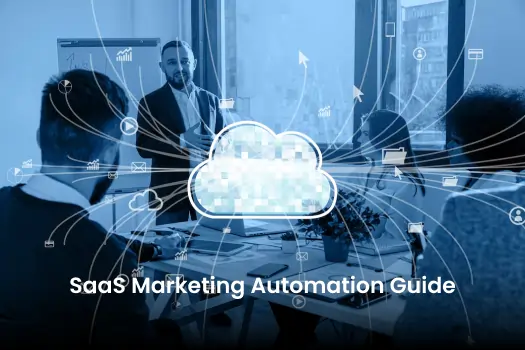Contents
In the ever-changing world of Software as a Service (SaaS), understanding conversion rates is critical to corporate success. This comprehensive book navigates the intricacies of monitoring, benchmarking, and increasing SaaS conversion rates, and provides crucial insights into client acquisition, retention, and essential saas growth strategies and saas lead gen tactics.
From examining industry norms to revealing benchmark rates at various funnel phases, including the intricacies of Saas branding, the book provides SaaS companies with the knowledge they need to enhance their conversion processes. As organizations strive for greater efficiency, considering the landscape of popular saas products, this book emerges as a vital resource, providing a roadmap for navigating the complexities of SaaS conversion dynamics and propelling firms toward long-term development and success.
Understanding Conversion Rates in SaaS:
SaaS conversion rates, a key indicator in the software environment, show the percentage of users that complete desired actions. This blog reveals the calculating technique, offering insight into the complex process of converting people from trial to paying customers or engaging with certain features.
Understanding the calculation is critical; it entails dividing the number of required activities related to SaaS website design and SaaS dashboards by the total targeted user group. The site emphasizes the formula's simplicity and walks readers through the importance of tracking conversions rigorously. Whether used on website landing pages, paid search, or email marketing, the complete strategy guarantees a thorough awareness of user engagement. This de-mystification of B2B SaaS conversion rates enables organizations to navigate the complex world of user behaviors, resulting in educated plans for ongoing success.

How to Calculate Conversions in SaaS
Calculating conversions in the dynamic world of Software as a Service (SaaS) necessitates a complex methodology. At its foundation, the principle is simple: the number of converted users divided by the target group. Various formulae are used to quantify different conversion stages.
1. Visitor Conversions:
- Formula: Number of sign-ups / Total visitors x 100.
- Insight: This formula evaluates the effectiveness of attracting visitors and converting them into trial or freemium users. A higher percentage signifies a successful visitor-to-user conversion strategy.
2. PQL Conversions:
- Formula: PQLs from trial/freemium users / Total trial/freemium users x 100.
- Insight: Identifying Product Qualified Leads (PQLs) is crucial. This formula isolates users exhibiting qualifying behaviors, offering insights into the conversion rate of users progressing from trial/freemium stages to PQLs.
3. Free Trial Conversions:
- Formula: Free trial conversion rate = Converted trials / Total trial users x 100.
- Insight: Focused on a specific timeframe, this formula assesses the success of converting free trial users into paying customers. A higher rate indicates efficient conversion tactics.
4. Freemium Conversions:
- Formula: Total freemium users / Converted active subscribers over a specific period.
- Insight: This formula gauges the effectiveness of converting freemium users into active subscribers. Understanding the transition from free to paid usage is pivotal for SaaS success.
Mapping Your Sales Funnel:
The critical process of mapping your sales funnel clarifies the importance of each phase and makes conversion rates easier to evaluate in the context of a SaaS sales strategy. Using a fictitious software firm as an example, readers get insight into defining feasible goals and identifying opportunities for improvement within their business processes. This strategic approach guarantees a thorough grasp of the sales process, allowing organizations to optimize their funnels for long-term success.

Benchmarking SaaS Conversion Rates:
In the ever-changing world of Software as a Service (SaaS), establishing industry b2b saas marketing benchmarks is critical for determining the performance of various conversion phases inside the SaaS funnel. Using data from credible sources, this blog digs into crucial benchmarks, giving light on what defines strong b2b saas conversion rates. Additionally, we will explore how incorporating a well-crafted saas marketing plan template can contribute to optimizing these conversion rates and enhancing overall SaaS marketing strategies.
Website Visitor to Lead Conversion Rate Benchmark:
- Capterra reports a benchmark of 7%.
- Capterra's research creates a baseline, demonstrating that an ideal online.
- Visitor-to-lead conversion rate is roughly 7%, establishing an important industry standard.
Free Trial and Freemium Conversion Rates:
- Gainsight’s 2022 report: Free trials involving Product Qualified Leads (PQLs) exhibit a 2.8X higher conversion than freemium models.
- Average Freemium Conversion Rate: Ranges from 1% to 10%, underlining the diverse performance of freemium offerings in the SaaS landscape.
- Tatango Survey: Free trial to paid conversion rate with credit cards stands at approximately 50%, showcasing the influence of payment commitment.
- Softletter Survey: Reports a 25% SaaS conversion rate for free trials without credit card requirements, providing insights into user behavior based on payment friction.
User Activation and Product Adoption Rate Benchmarks:
- User Activation Benchmark: Research by Lenny Rachitsky and Yuriy Timen indicates an average activation rate of 36% for SaaS companies.
- Product Adoption Rate: File Sharing and Collaboration Tools: 20.9% adoption rate.
- Education-related SaaS Platforms: Second with a 7.5% adoption rate, highlighting varied adoption trends across SaaS niches.
Customer Churn and Retention Benchmarks:
- Customer Churn Rate Benchmark: The average churn rate for SaaS is 4.79%, emphasizing the importance of retaining customers for sustained growth.
- SaaS Capital Research (2023): Median net retention across SaaS companies is 102%, showcasing the industry's capacity not just to retain but grow customer relationships. Median gross retention stands at a robust 91%.
Metrics and Measurement Strategies:
When optimizing for conversions and revenue on the best SaaS website designs, marketers must consider additional metrics. Here are five more indicators that any SaaS marketer should factor in:
Revenue churn: This indicator calculates monthly or yearly revenue losses from customer turnover as a proportion of total sales.
Customer churn - The monthly number of lost customers as a proportion of total customer count - is another crucial measure to monitor. A high churn rate may indicate that you should invest more in client retention and product adoption initiatives, which can positively impact saas reviews.
Time to value: This is a vital point in the user experience when they recognize the worth of your SaaS solution. Knowing when that moment arrives may help a SaaS firm improve the user journey, allowing consumers to reach there faster. The sooner a client realizes the value of your SaaS solution, the more likely you are to keep them and avoid churn.
Monthly recurring revenue (MRR) against annual recurring revenue (ARR):These figures provide insights into the income a SaaS firm generates monthly or annually. A thorough understanding of existing MRR and ARR and your contribution to these metrics is invaluable for your marketing team. Incorporating saas ltv calculation and saas reporting can further enhance your strategic approach.
Client acquisition cost: This indicator indicates how much it costs to attract and acquire a new client. To determine customer acquisition cost, sum the entire monthly sales and marketing expenditures, as well as any other relevant costs such as wages and overhead, then divide by the number of customers acquired.
Customer lifetime value: CLV is the total income that a customer account earns during its lifetime. Customer lifetime value grows according to customer account lifetime.

Conversion Rate Optimization Strategies for SaaS Companies
Understanding the baseline:
Measure and set goals: Begin your Conversion Rate Optimization (CRO) journey by evaluating your current conversion rate and defining a benchmark for improvement. Set reasonable yet ambitious conversion rate targets to drive your optimization efforts.
Effective CRO Tactics:
Harness Testimonials: Display customer testimonials strategically on web sites to create confidence and authenticity, causing prospects to experience Fear of Missing Out (FOMO).
Integrate chatbots: Implement chatbots to drive quick engagement by helping prospects through their questions and enabling real-time conversation.
Headline and CTA Testing: Use intriguing headlines and Calls to Action (CTAs) above the fold to quickly attract prospects' attention. Experiment with language that resonates with those interested in saas affiliate marketing or seeking clarity on saas sales meaning to capture a targeted audience.
Power of Personalization:
Maximize personalization with machine learning. Accept machine learning as a data-driven approach to CRO. Test various techniques at the same time to see what resonates with your target audience and adapt experiences based on firmographic data and previous interactions.
Intellimize offers Continuous Conversion™ Solution
Automated tests: Intellimize's breakthrough technology uses machine learning to simultaneously test several concepts. This data-driven technique identifies the most efficient mix of page components for each unique visitor.
Personalized experiences: Prioritize customisation by taking into account job title, level, and industry. Tailor each visitor's experience to their own traits and previous encounters with your brand.
Pricing Page Optimization:
Learn the secrets of optimizing your pricing page to enhance your SaaS go-to-market strategy. Discover best practices for converting price pages into conversion catalysts. Businesses may intentionally impact consumer decisions by restricting alternatives, highlighting feature differentiators, and pushing yearly subscription plans. The article underlines the importance of price in the SaaS conversion environment, acknowledging its ability to persuade potential customers to commit. With an emphasis on engaging Calls to Action (CTAs) and user-centric design, this article teaches users how to create price pages that not only capture attention but also generate conversions. Elevate your SaaS price approach, connect it with customer preferences, and watch how improved pricing pages contribute to higher total conversion rates.
Conclusion:
In the ever-changing environment of Software as a Service (SaaS), this book serves as a compass for attaining conversion excellence, a critical component of business success. It helps SaaS organizations improve customer acquisition and retention by demystifying computations, revealing benchmark rates, and implementing optimization tactics.
Understanding the fundamentals of conversion rates in SaaS is critical, allowing firms to assess performance and modify tactics. Organizations receive insights into user behaviors at different funnel phases by deciphering the complexities of visitor, PQL, free trial, and freemium conversions. Benchmarking to industry norms provides a solid platform for performance evaluations. From website visitor-to-lead standards to customer turnover rates, organizations assess their performance and strive to outperform the norm.
Beyond traditional metrics, the guide delves into revenue churn, time to value, MRR vs. ARR, customer acquisition cost, and client lifetime value. By including these KPIs in the conversion optimization path, SaaS marketers may fine-tune tactics for long-term development.
The course emphasizes CRO through testimonials, chatbots, headline testing, and machine learning's transformational potential. Tailoring price pages appears as the ultimate frontier, where strategic decisions boost total conversions. In a market where every click counts, this guide provides a road map for navigating SaaS conversion dynamics, allowing organizations to build their destinies for long-term success.
Get The SaaS Marketing Toolkit
Related Blogs
We explore and publish the latest & most underrated content before it becomes a trend.
6 min read
A Step-by-step Guide To Create the Right Marketing Automation Strategy
By Sabah Noor
Subscribe to Saffron Edge Newsletter!

Get The SaaS Marketing Toolkit










